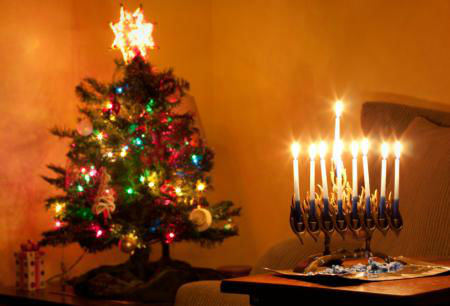Connections between Hanukkah and Christmas
The eight day festival of Hanukkah that begins on Tuesday evening Dec. 16 has incorrectly been called the "Jewish Christmas" because the two holidays both emphasize light and are celebrated during the same dark days of winter.
However, even though the festivals are very different in the messages they convey, there are several noteworthy connections between Hanukkah and Christmas.
During Hanukkah (the Hebrew term means "Dedication" and is also the word root for "education") special prayers are said each night of the holiday as the colorful candles are lit in the synagogue and home candelabrum or menorah, gifts are exchanged and caloric heavy and cholesterol laden potato pancakes fried in oil along with jellied donuts are eaten. Gifts are exchanged within families and among friends and beloved holiday songs are sung.
Hanukkah commemorates the struggle in the land of Israel between 168-165 BCE when Judah Maccabee's Jewish guerillas, after three years of fighting, defeated the much larger and better-armed Greco-Syrian army of Emperor Antiochus IV, a tyrannical ruler who reigned over a part of Alexander the Great's former empire. Antiochus prohibited the study of Torah, ritual circumcision, kosher dietary laws, Sabbath observance and the practice of Judaism itself. A first hand account detailed Antiochus' brutality:
"The Books of the Torah which the men of Antiochus found, they tore into pieces and burned. Wherever a book of the covenant was found in anyone's possession, or if anyone respected the Torah, the decree of the king imposed the sentence of death upon him. Month after month, they dealt brutally with every Jew who was found in the cities...In accordance with the decree, they put to death the women who had circumcised their children, hanging the newborn babies around their necks; and they also put to death their families as well as those who had circumcised them..."
When Judah recaptured Jerusalem, he demolished the statues of Zeus and other idolatrous symbols of Antiochus' rule inside the Holy Temple and rededicated the sacred area, the Temple Mount, to the service of God. Tradition teaches that the small quantity of olive oil Judah found was sufficient to fuel the Temple's Eternal Light for only one day, but the oil lasted eight days; an event described as a "miracle."
Many historians agree that Hanukkah represents an early struggle for what we today call "religious liberty" or "freedom of conscience." The holiday is an annual reminder that every faith community has the right to maintain its customs, ceremonies, traditions, and teachings, and no ruler, government, or regime has the right to dictate what people can and cannot believe.
That is why Hanukkah's message is as fresh and meaningful in our time as it was more than 2100 years ago. Today there are forced religious conversions that involve helpless kidnapped young children, physical persecutions including beheadings based upon one's religious identity, and numerous "religious wars" rage in the Middle East, Africa, Myanmar and in other parts of the world. Antiochus' evil spirit remains a modern threat to the hard won principle of religious freedom.
Some historians also believe that without the Maccabees' victory and the preservation of Jewish religious life in ancient Israel, Christianity may not have emerged 200 years later with its taproots deeply embedded within Judaism. The only scripture Jesus knew was the Torah that the Maccabees helped preserve in their battle against Antiochus' malevolent decrees. The Jewish Holy Temple in Jerusalem mentioned in the New Testament was saved from desecration and re-dedicated to God a century and a half before Jesus was born.
But in an ironic twist of history, the two books of the Maccabees that relate the Hanukkah story do not appear in the Jewish scriptures, but they are part of the Roman Catholic canon. In addition, the New Testament records that Jesus, similar to other Jews of his time, celebrated Hanukkah: "It was the feast of the Dedication at Jerusalem; it was winter, and Jesus was walking in the temple, in the portico of Solomon." (John 10:22-23.)
As Jews and Christians celebrate our distinctive December festivals of faith and light, perhaps we should all pause and remember Judah Maccabee's long ago victory over the forces of darkness, despotism, and death.
RABBI RUDIN IS THE AMERICAN JEWISH COMMITTEE'S SENIOR INTERRELIGIOUS ADVISOR AND THE AUTHOR OF "CUSHING, SPELLMAN AND O'CONNOR: HOW THREE AMERICAN CARDINALS TRANSFORMED CATHOLIC-JEWISH RELATIONS."



















